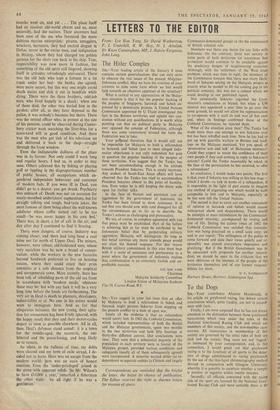S1R,—You suggest in your last issue that an offer by
Malaysia to hold a referendum in Sabah and Sarawak might prevent Sukarno from stepping up the present conflict to a state of open war.
Surely all the evidence is that no referendum would satisfy him. In 1962 the Cobbold Commission, which included representatives of both the British and the Malayan governments, spent two months in, the two territories and held fifty hearings at thirty-five different centres. Our conclusions were clear. They were that a substantial majority of the population in each territory were in favour of the Malaysia project, provided various conditions and safeguards (nearly all of them subsequently agreed) were incorporated. A minority wanted either (a) in- dependence as separate entities (a Chinese and largely
Communist-dominated group) or (b) the continuance of British colonial rule.
Nowhere was there any desire for any links with • Indonesia. On the contrary, there was anxiety in some parts of both territories for assurances that protection would continue to be available against the predatory designs of neighbouring countries. Although, with the settlement of the West Irian problem, which was then in sight, the members of the Commission foresaw that there was every likeli- hood of Sukarno seizing on the Malaysia project as exactly what he needed to fill the coming gap in his political armoury, this was not a subject which we could develop in our published report.
Not unnaturally Sukarno regarded the Com- mission's conclusions as biased, but when a UN mission was appointed a year later to go over the same ground, he would not allow his representatives to co-operate with it until its task was all but over and, when its findings confirmed those of the Cobbold Commission, he rejected them.
What of the situation since then? The Tunku has made more than one attempt to win Sukarno over but has been rebuffed each time. Now he has had to put up with guerrilla warfare in Borneo and land- ings on the Malayan mainland. Yet you speak of 'provocative acts and talk' of Malaysian ministers! Could they expect to retain the confidence of their own people if they said nothing in reply to Sukarno's actions? Could the Tunku reasonably be asked, in the face of the provocation he has received, to offer a referendum?
. In conclusion, I would make two points. The first
is that, even if Sukarno was willing at this late stage— which 1 doubt—to talk in terms of a referendum, it is impossible in the light of past events to imagine any method of organising one which would be both acceptable to him and to Malaysia, especially as he has now left the United Nations.
The second is that to carry out another assessment
of opinion in Sarawak and Sabah would arouse widespread alarm and despondency. There would be attempts at mass intimidation by the Communist- dominated minority, accompanied by rioting and loss of life. During the calmer times of 1962 the Cobbold Commission was satisfied that intimida- tion was being practised on a small scale only; we said in our report: 'The willingness of the public to come forward and state their views quietly and re- sponsibly was almost everywhere impressive and gratifying.' But if the British Government was to be associated with proposals for another referen- dum, we should be open to the criticism that we were oblivious of the interests of the people of the territories themselves and of our former responsi- bilities for them.
D. C. WATHERSTON
Harbury House, Harbury, Leamington Spa






























 Previous page
Previous page